#Whole Damn Mess
Text
Yes, yes, Sanji letting Zoro help in the kitchen by letting him chop vegetables because he's good with pointy objects.
BUT. Have you considered?
They live in a world without most electrical appliances. A FUCKTON of physical labor goes into baking (and keep in mind how often Sanji bakes treats for the girls).
Sanji being tired (physically) and not feeling like taking 10 min to whip whipped cream. Being tired (mentally) of Zoro making fun of him for never working out. Sanji saying "fuck it" and just starts putting him to work.
The foccacia dough needs to be kneaded? "Have fun working a sticky mess for 20 minutes, asshole"
Need meringue? "No, STIFF peaks marimo. Don't tell me you're wimping out already"
"Are you even TRYING to flatten that steak Marimo?"
"Yes, it needs whipped cream. YES, I know you just made some yesterday. We need more"
Zoro's shoulders are burning but he's trying SO HARD not to lose face with the cook and meanwhile Sanji is silently losing it at Zoro's shock that cooking can in fact be a workout
#zosan#sanji#zoro#strawhats#op#one piece#this post brought to you by my burning shoulders#i love bread but damn#also i have made whipped cream by hand before#yes it was a complete pain.#would not recommend#i think im gonna start tagging these posts#maybe.....#anime posting#?#good as anything for now i guess#...ok i realize schnitzel isnt baking but my point still stands#also#rereading this#beating meat#stiff#sticky mess#good lord there's just a whole host of innuendo here#obviously this could be platonic too i just automatically tag it as zosan
2K notes
·
View notes
Text






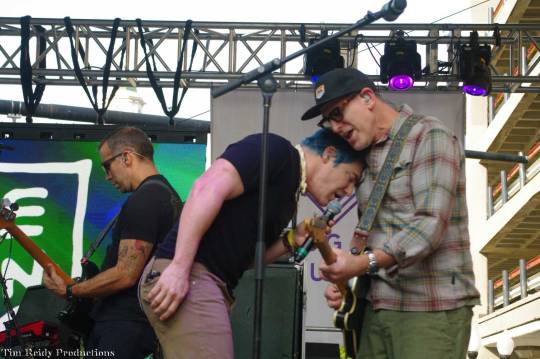


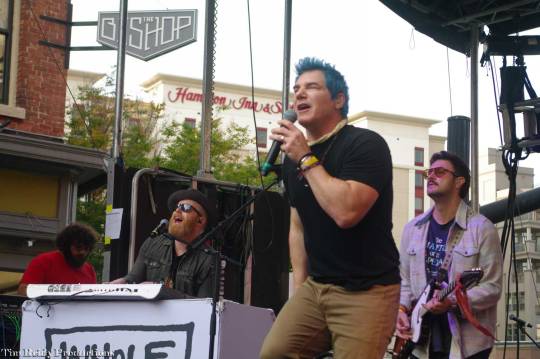
PearlPalooza 2022: first and 10 edition: Whole Damn Mess
0 notes
Text
Nine and Ten's arcs go hand in hand as a collectively great PTSD narrative imo.
I think Ten's wishy-washiness about relationships and inability to fully open up to Rose is often characterized as plain old fear of commitment yet I see that as a progression to another presentation of PTSD.
When we first meet Nine, he seems like he's halfway to planning on how to get himself killed.
He meets Rose, he heals, he changes, he grows.
Then he regenerates into someone with a desire to live and the seeming capacity to just be happy.
At the same time, he regenerated for and because of Rose.
Recovery that hinges on one person is a tricky thing.
When you're with that person it can feel like there's no more work to be done, like you're totally 'fixed'.
Every moment with that person feels like the best thing in the world... which makes it significantly harder to open up about anything trauma related.
When you're feeling high on a person's presence why would you ever want to think about the bad things?
THEN because he finally properly wants to live, The Doctor gets hit with the realization that living a full life means losing Rose in the end and it's downright intolerable to him.
It makes him push and pull and act like a bastard sometimes.
We get glimpses of who he is without her in the moments when she's threatened.
He loses his damn mind any time she's threatened- he gets that crazed look akin to Nine in Dalek more than anything. This is also in contrast to how Nine used to react to Rose being threatened, where he used to still be able to keep it reined in.
THEN... he loses her for real and he backslides majorly. We see the effects in Turn Left, that if Donna hadn't been there he would have died right after saying goodbye to Rose. He's more or less back where he started as Nine in the beginning of series one, looking for a way to die.
He lives though, and has to accept that no, he's not perfectly recovered and keep on working on it. He opens up about things in ways we saw him struggle to in series 2.
Though he's more callous in series 3 and 4, he seems to struggle more with relating to humans, his bastardous tendencies pop up more.
He's also a freaking disaster man in series 4 with the number of times he offers or tries to give up his life for others. He DOES make recovery progress through series 3 and 4, just is slow like in real life.
All of that makes JE make sense to me in that this is a man who is experiencing turbo PTSD triggering. He pushes everyone away all at once, because maybe being alone will hurt less than losing people after all.
Even after all that in the end when he is dying he says he doesn't want to go. He was born into wanting to live and be happy so of course he doesn't want to go.
#doctor who#ninth doctor#tenth doctor#rose tyler#9th doctor#10th doctor#timepetals#there's a lot more nuance to this than I had energy to write about rn#but regeneration as ptsd recovery story is so interesting to me in general#bc it literally does/can feel like you have to become a whole new person#and it's so so easy to hinge it all on one person or thing that makes life worth living#ten is a somewhat toxic mess#and i love him for it#he's a bastard who is also trying his damn best
301 notes
·
View notes
Photo
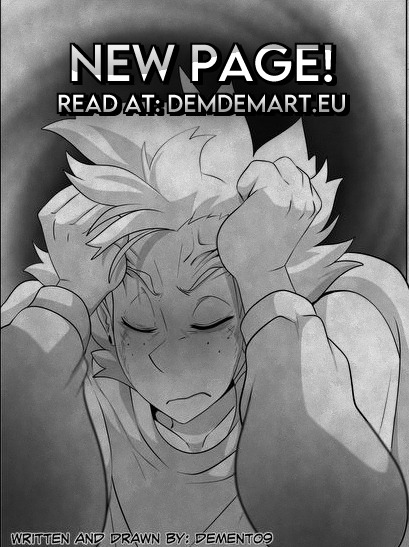
wow that image is crusty
2 NEW PAGES THIS WEEK!
#dement09#so far#lapidot#human au#this whole damn mess can be summarized with Oh its the Consequences of my Own Actions#why am i the way i am#kinda deal
251 notes
·
View notes
Text
@pumpkinpaperweight had a dream and now im suffering with brainrot. The "only sophie got taken so agatha went after her" post, and im not ok, im not ok. I have this plot in my head now, ideas and dialouges, but will i actually do it? idk
so here's a couple sketches i did, what i imagined what happens at the aftermath of the kidnapping

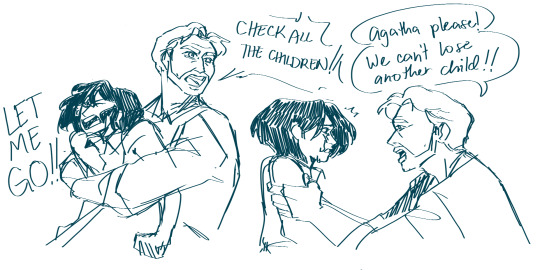
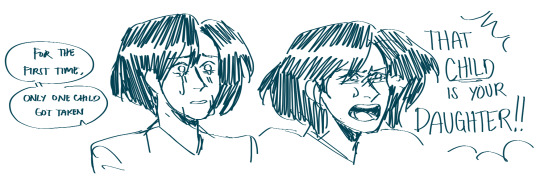

aaaarrghh i want this to be a full blown au so bad you have no idea i am not okkk aaaaaaaahh
#this au has me in a chokehold#damn i havent drawn agatha in so long i miss her so much#i lowkey dont like stefans design sobbs#lmao this is probably the closest thing i draw of them as father and daughter#I HAVE THIS WHOLE IDEA WITH CALLIS TOO BUT I DIDNT DRAW IT AWRHRTGHG#i just really love the idea of agatha going on some heroes quest thing to bring sophie back home#the adventure would be so fun#and also the mess thatll come when she reached the school#man i need someone to talk to about this im going insane#hi kate thank you for this au now ill cry in a corner#sge#sge fanart#school for good and evil#agatha sge
136 notes
·
View notes
Text
Finally read the new chapter properly and the only thing i care about it the itadori family drama of it all
#rambles#ohhhhh now i gotta draw more fucked up itadori family#its literally my favourite thing#rip to twin theory with yuji but also its funny as hell they're uncle/nephew#but kinda also father/son#yknow. with the whole twins are considered one. and how sukuna refers to his twin as his fragment/a part of himself#damn yuji ur mama and “papa” are kinda messed up LMAO#jjk 257#jin itadori#kenjaku#ryomen sukuna#itadori yuji
28 notes
·
View notes
Text
"YoU cAnT liKe ThAt ChArAcTeR tHeY [bad action which is integral to the story and why the story is so good in the first place]"
My brother in Christ,
They are not real.
#i hate when people do this#im looking at you fuckers in the omori community#tell me one more time why i cant like sunny or basil and i am sending you into the sun#did you not get the whole point of the game? did you even play the game????#mf's really play a game about forgiveness and that bad actions dont necessarily correlate to bad people#IT IS LITERALLY ONE OF THE MOST IMPACTFUL LINES IN THE FUCKING GAME#AND ITS KEL WHO SAID WHO THESE MF'S SEEM TO LOVE BECAUSE HES THE CUTE LITTLE INNOCENT BOY WITH NOTHING WRONG WITH HIM#which for the record is a fucking lie Kel is an emotional mess and also not a fucking moron#sorry for getting so annoyed its just irritating because i see it so damn much#random rambles
80 notes
·
View notes
Text
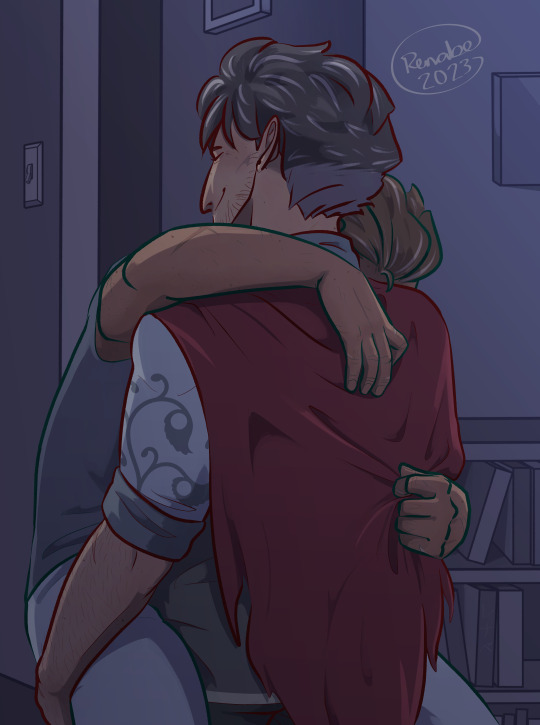
"Togethers and Tomorrows"
A quiet scene from chapter 35 of And the Reason Comes, by @whatacartouchebag as a wee birthday present for a precious friend. I have been wanting to draw this since the chapter was posted, just thought you should know ♡
#fair game#qrow branwen#clover ebi#rwby#rwby fair game#qrow x clover#Reason#renabe#plant is so so sleeby#and bird can only sigh softly at him for waiting up#and carry him to bed ♡#i went to reread the scene to refresh my memory on how the wee plant was being carried#and damn near got distracted a handful of times#wanting to read the whole chapter but knowing i'd be a sobbing mess if i did#since you're so good at that with your words :')#laksdhf okay outta the tags with me#but wehhhh love you friend#and love this beautiful fic you've poured your heart into ♡#thank you always for sharing it
167 notes
·
View notes
Text
As promised, an update now that both Bug and Bunny are safely back home from the vet. Turns out there's honestly not much to tell you. Bunny thankfully didn't end up having any more episodes or showing any worrying behaviours, and after checking everything over a second time, they're almost certain that the lizard or snake that she ate part of, was what caused the seizure in the first place. Something I honestly didn't know was possible, despite being aware that some reptiles are toxic for cats, but I guess you learn something new everyday.
Bug was his usual menace self while at the vet, and even attempted to make a move on an elderly cat that they were watching for the night, despite no longer possessing the necessary parts to actually do anything about his infatuation. Apparently she proceeded to give him a thorough enough verbal dressing down, with a few additional educational swats just for his sheer audacity, that he ended up sulking the rest of her stay. He went right back to being his usual dramatic yelling self soon after, and made sure to inform everyone of his ill fated would be romance on the train ride back home.
They've both since settled down for a well earned nap after the stress of the strip and the tiring ordeal of removing the scent of the vet from each other.
As an apology for my being such an insufferable stress head throughout this whole thing, please enjoy four straight minutes of the fluffballs noisily grooming each other after arriving home. Once again I apologise for the irritating screaming of my aircon, there's nothing I can do to fix it.
Enjoy 🖤
#mod speaks#Bug and Bunny#I'm not kidding it really is 4 straight minutes of the most obnoxiously loud grooming you've ever heard#it's rare for them to be still long enough or me to get photos or videos though. so... yeah#THIS is the damn post that vanished on me the other day! It suddenly popped back up as I was trying to retype it today#only with the second half missing#unfortunately since I'm still not certain what caused this whole mess I've decided to post it as is#Sorry Darlings. and thank you for being so patient#Oh and I apologise for any typos. I can't really go back and edit it at the moment
57 notes
·
View notes
Photo


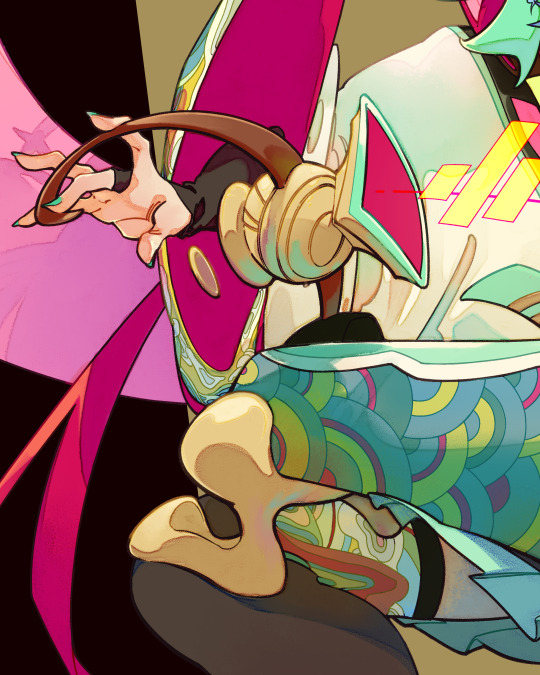
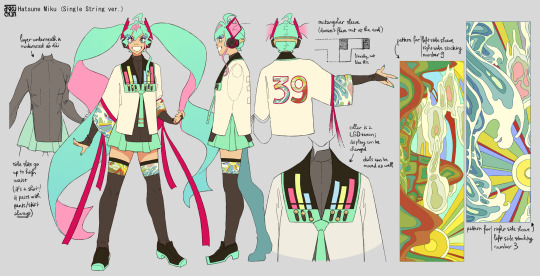

Detail caps and design sheets for the Single String ver. module!
Most of these tidbits except for the base elements are fluid, esp. the patterns - it’s up to freehanding whatever fits on a piece-by-piece basis. The outer coat is a modernized nhật bình, and the instrument is a very heavily stylized đàn bầu.
#VOCALOID#hatsune miku#Hatsune Miku Single String Ver.#the whole time I was doing these I was like damn. would be awesome to know how to 3d sculpt right about now#well. I persisted. and now I shan't have to do it again. and that's what's important#anyways!! feel free to mess around and use this module 1/for non-commercial use and 2/with credits!#as is with my other fanstuff. and also please don't edit my art directly. thats it go wild have fun#okay. I will go out on a little thang tomorrow. so now I must sleep#have a good night lads! I will sleep well tonight now that I've had her. now that she's here. excellent night for me
515 notes
·
View notes
Note
Hi! Out of curiosity, what was the whole drama with Charlotte and Augustin? I’ve tried reading it in several Robespierre biographies and it’s never made sense
Good question! That you couldn’t find an answer in a biography that made sense is not all that weird, I tried looking over the ones I had access to and those that touched on the fight all got it wrong in some way in my opinion. The reason for this, besides the fact that the conflict is a pretty small detail in the grand scheme of things, is probably that we have several different sources mentioning it that all put their own spin on it in some way or another. I would say these sources fit into three categories:
First off, we have contemporary letters dealing with the fight written by Augustin and Charlotte themselves. These include an undated letter from Augustin to Maximilien, as well as a letter dated July 6 1794 from Charlotte to Augustin.
Second off, we have what Charlotte had to say about the fight in Mémoires de Charlotte Robespierre sur ses deux frères, published in 1834 by Albert Laponneraye.
And third, there’s what contemporaries said regarding it. This mostly includes Armand Joseph Guffroy’s Secretes de Joseph Lebon et ses complices (1795) as well as the memoirs of Maurice Gaillard.
The fight, as far as we’re concerned, dates back to Augustin and Charlotte’s trip to the Army of Italy, where the former was tasked to go by the Committee of Public Safety on July 19 1793. Augustin set off a few days later together with Jean François Ricord, another representative on mission. For company, Ricord brought his wife Marguerite, while Augustin (on Charlotte’s request, if we’re to believe her memoirs) brought his sister.
We only have Charlotte’s memoirs to rely on regarding what played out between her and her brother during the trip. According to them, the group, after a time of traveling from town to town with counter-revolutionaries constantly after them, finally settled in Nice for a longer period of time. There, Augustin and Ricord made frequent outings to different divisions while Charlotte and Marguerite occupied themselves with making shirts for the soldiers during the day and went for walks and horseback rides in the countryside in the evenings. This latter activity soon proved to be troublesome, as ”several journals paid by the aristocracy” back in Paris started accusing the two women of acting like princesses with their equestrian outings. As a consequence, Augustin vetoed further horseback rides after receiving a letter from Maximilien regarding the issue, and Charlotte promised to abstain from riding from then on. But not long after, Marguerite, who according to Charlotte ”was the most frivolous and inconsiderate person in the world,” proposed they should go on yet another ride, and Charlotte, after trying in vain to remind her of what her brothers had said, hesitantly joined her.
When Augustin reproached his sister for the ride a few days later, Charlotte called on Marguerite to testify that it had been her idea. But Marguerite, instead of telling the truth, not only enforced the lie that it was Charlotte that had wanted the ride, but also added that she had taken her with her against her will. Augustin chose to believe her, much to Charlotte’s distress — ”My brother knew I was incapable of lying. Why then did he not want to believe me?” After this incident, Augustin started keeping a certain coldness in regards to Charlotte which caused her much despair, though it would not appear she tried to approach her brother to explain herself again.
The straw that broke the camel’s back came when Marguerite a while later suggested to Charlotte that they should go to Grasse together, something Charlotte agreed to do. But hardly had they arrived when Marguerite came forward with a forged letter, telling Charlotte it was from Augustin and that he urged her to return to Paris as soon as possible. A shocked Charlotte obeyed and set out for the capital the following morning, ending her journey somewhere in the fall of 1793. Marguerite in her turn went on to slander Charlotte to Augustin, saying that she didn’t care about him and that this was the reason for her brusque departure. She and her friend Madame Gesnel made him believe Charlotte had caluminated both Augustin and Madame Ricord. According to Charlotte, Marguerite was seducing her brother, who ”believed it essential to his honor and duty” to respond to her advances (it might be added that this is very similar to how Charlotte explains the relationship between her other brother and Éléonore Duplay). It evidently worked, and Augustin refused to see his sister when he too returned to Paris for a short stay (December-January), choosing instead to move in with the Ricords. He told Maximilien about both Charlotte’s brusque departure from Grasse, as well as her compromising the honor of him and Madame Ricord, causing the former to become angry with her too.
Such is the story as presented by Charlotte in her memoirs. Parts of it can and has been questioned, above all the idea of Augustin as completely innocent in the drama. Both Maximilien’s biographer J.M Thompson and Augustin’s Mary Young instead embrace the idea that there did exist a mutual liason between Augustin and Madame Ricord that Charlotte became an annoying witness to. Thompson declares himself sceptical in regards to the idea of Marguerite forging a letter from Augustin, while Young completely dismisses it and instead suggests the letter did indeed come from the pen of Augustin, eager to send his sister away so she wouldn’t be in the way of his love affair. The idea that there was something more than platonic friendship between Augustin and Marguerite also appears in the memoirs of Paul Barras, who served as a representative to Toulon at the same time as Augustin and Ricord:
Fully convinced that women constituted a powerful aid, [Bonaparte] assiduously paid court to the wife of Ricord, knowing that she exercised great influence over Robespierre the younger, her husband's colleague. […] Robespierre the younger was particulary attached to Madame Ricord.
Besides the question of Augustin’s guilt, it can also be observed that the letter where Maximilien tells his siblings about the controversy Charlotte’s horseback rides were causing has never been found. I’ve also not seen anyone point out the journals denouncing Charlotte and Madame Ricord’s outings the memoirs are alluding to…
If this first bit of drama can be boiled down to a mere personal feud, it gets harder to make the same case when we get to the second part of the conflict. This is where the first of the two contemporary letters — the one Augustin wrote to Maximilien — comes into the picture:
My sister does not have a single drop of blood that resembles ours. I have seen and learned so much about her that I regard her as our greatest enemy. She abuses our spotless reputation to lay down the law on us and threatens to take a scandalous step in order to compromise us. We must take a decisive stand against her. We must make her leave for Arras, and thus take her away from us, a woman who causes our common despair. She would like to give us the reputation of bad brothers, her calumnies spread against us aim at this goal. I would like you to see the citoyenne La Saudraie, she would give you certain information on all the masks that it is interesting to know in these circumstances. A certain Saint-Félix seems to be from the clique.
This letter is unfortunately undated, but two things has lead to all historians up until this point to place it somewhere in April-May 1794. The first is the fact that Augustin makes allusions to Guillodon La Saudraie whose first known contacts with Augustin (of whom she, according to the memoirs of Charles Nodier, was the presumed mistress) are from the first half of 1794, when she accompanied him on his second mission. Augustin had already in a letter dated March 24 also asked Maximilien to offer her an audience, and it seems likely for this to have been a follow-up to that.
The second clue is that, on May 19, a letter written by Augustin Darthé revealed that Charlotte had come back to Arras two days earlier, just like her younger brother asks for above. She had been escorted by Joseph Lebon, representative to Arras who Maximilien had recalled to Paris on May 14, saying that the Committee of Public Safety had decided to direct his energy ”in an even more useful way” and telling him to ”come back as soon as possible, to return promptly to the post where you currently are.” I have chosen to believe ”the more useful way” Maximilien suggests Lebon should use his energy for alludes to the mission of bringing Charlotte back to their hometown.
It can be observed that, if it’s true the letter to Maximilien is from April-May 1794, Augustin wouldn’t have met his sister since the fall of 1793 (assuming Charlotte is telling the truth in that he didn’t want to see her during his short break in Paris). The question is therefore evidently what exactly Charlotte had done for it both to reach the miles away Augustin and make him think this ill of her. In her memoirs, Charlotte passes in total silence on both this letter and her exile to Arras (and with that, the question of whether she gave her consent to being sent there or not). Since the accusations in Augustin’s letter are so vague, it gets hard to verify what exactly she’d done to make him so upset, other than it seems to be about her 1, slandering her brothers and 2, doing something scandalous. The first charge I suppose could tie in with Augustin falling for Madame Ricord’s claim that Charlotte was caluminating him, as the memoirs would have us believe. However, we do also have several pieces that could fill the criteria for the second charge that all date back to around the same period Augustin allegedly penned down his letter.
First off we have a letter written on April 25 1794 and sent off to Charlotte. In it, the author brings her up to speed regarding the recent repressive politics their hometown Arras for the past months has been the victim of:
What has been said of your country is true; for six weeks one hundred and fifty people have been guillotined and about three thousand imprisoned. […] I’ll spare you other details that are too atrocious to be believed, when you haven’t been an eyewitness. If I had more time, I could have given you more detailed facts; I cannot tell you what I have heard from different people without having had the time to verify it. We go into the countryside tomorrow. I forgot to tell you that the prosecutor of the revolutionary tribunal is arrested and the revolutionary commissar broken.
He also makes allusions to a commission Charlotte is part of, that appears to have as its goal to slow down the repression apparatus. This commission may be what the deputy Armand Joseph Guffroy is alluding to in the following part of his Secretes de Joseph Lebon et ses complices (1795):
I was not discouraged; Leblond’s sister, Demeulier’s (sic) daughter, Buissart’s wife, Robespierre’s sister, to whom he was also almost invisible, took every means to reach him.
Speaking of Guffroy, the second piece is a letter dated May 7 to him from the arragois lawyer Antoine Buissart, a friend of both him and the Robespierre siblings. The letter confirms Charlotte’s interest in what was going on in Arras:
We salute the citoyenne Robespierre; my wife has just received her letter; tell her as soon as possible that I will immediately give her the clarifications she requests.
Furthermore, as shown through the above cited letter, Charlotte came to see Guffroy (this was something she would herself confirm when interrogated after thermidor, adding that Madame Duplay reproached her for it). It is not impossible this relation caused dislike in Augustin, who, along with his brother, had ”a great contempt” for Guffroy if we’re to believe the memoirs of Élisabeth Lebas. Since March 3 1794 Guffroy had also become suspect in the political arena, as he on that day had been expelled from the Jacobins accused of having connections with a former marquis, forcing the Revolutionary Committee of the Picques section to release Louis XVI’s former locksmith and having English letters found among his papers. This denounciation had also forced him to resign from his functions as member of the Committee of General Security. Guffroy was himself convinced that Charlotte visiting him was the reason for her fallout with her brothers, as this is what he wrote about it a year later:
[The brothers] drove [Charlotte] out of their house because she did not think like they did, because she came to see my wife and because she saw citizens who were sincere friends of justice and truth.
Finally, there’s also a passage (1, 2) from the memoirs of Maurice Gaillard that’s of interest here. Gaillard claims to have met Charlotte somewhere in May 1794 to hear her opinion on the magistrates of Melun having been denounced for two years earlier signing an adress denouncing the demonstration of June 20, 1792. Charlotte not only expressed her disapproval when it came to this affair, but also deplored of the terror in Arras and raged against the Duplay family. She then helped arrange an interview between Gaillard and Couthon, but when the latter got threatening she holds him still in the armchair he was sitting while yelling at Gaillard to escape. Tracking him down again she tells him that ”the wretched man merely wanted to discover your inmost thoughts” but that she ”succeeded in making him ashamed of the crime which he was about to commit against one whom I had introduced to him in confidence.” She then urged Gaillard to flee the city, which he also went ahead and did. Curiously, Charlotte appears to think the conflict between her and Augustin to be old news in Gaillard’s account, talking instead about how she’s eagerly awaiting his return so he can help her get Maximilien to move away from the Duplays.
(note that these four pieces are very rarely (I might say never) used by Robespierre biographers who talk about the conflict a bit more in detail).
Whatever it was Augustin’s letter was alluding to, Charlotte ended up in Arras. We know through a letter her step-cousin wrote to Augustin that she doesn’t appear to have made their fallout known to her friends there (so again, pretty far from Augustin’s charge that Charlotte had slandered her brothers). Her stay was nevertheless short, already on July 1 we find a letter confirming she was back in the capital. Charlotte’s reason for leaving is unknown, but according to Guffroy it was to avoid arrest:
Lebon had [Charlotte] denounced to the popular society of Arras, by his cutthroats, as an aristocrat. Her apparent crime, and at least the pretext for her arrest, was to have been with Payen de Neuville la Liberté, an estimable farmer, whom Lebon had guillotined, and brother of another Payen, member of the constituent assembly who had served as father and friend to Robespierre, and whom Lebon likewise had guillotined. […] Without Florent Guyot (sic), who brought her back to Paris, she would have been imprisoned there, because Lebon's accomplices had denounced her in their infernal club which they called the popular society.
While most historians I’ve looked at have dismissed this as mere slander, it can nevertheless be observed that the dates of execution for the two Payen brothers Guffroy is talking about (June 21 and 26) matches rather well with the time Charlotte’s would have departed from Arras… On June 28 we do actually find a letter from Antoine Buissart to Maximilien, telling him that since a month back, he, his wife and Charlotte have been denounced by a certain Carlier, administrator of the department of Pas-de-Calais — ”You know that from this time on I am a conspirator in the eyes of the famous Carlier, and my wife and your sister two intriguers.” Guffroy did in his turn call the same Carlier ”Lebon’s fiercest lieutenant” so it may actually be him he accuses of having denounced Charlotte here above…
Augustin had returned to Paris just before Charlotte. In her memoirs, Charlotte describes the situation between them in the following way:
He seemed to be fleeing my presence. I admit it, I was indignant against him; what had I done to him, I said to myself, for him to treat me this way, for him to say to anyone who will listen that I am unworthy of him, that I conducted myself badly with him, that I no longer deserve his esteem? It was then that I wrote him the letter that Levasseur recorded in his Memoirs.
This is the second of the two contemporary letters regarding the fight, dated July 6. In her memoirs, Charlotte tried to declare certain phrases of it as embellishments by her brothers’ enemies, but an encounter with the fac-simile of it proves that she was actually lying there.
Charlotte begins the letter by writing that Augustin’s aversion for her has developed into the most implacable hatred, to the point that they can’t even talk to each other anymore. Because of this she will instead try to write to him. She tells Augustin how hurt she has become by his hostility — ”what does it matter to me that I am hated by those who are irrelevant to me and who I despise? Their memory will never come to trouble me, but being hated by my brothers, I, for whom it is a necessity to cherish them, this is the only thing which can render me as unhappy as I am” — a hostility she considers herself completely undeserving of. Despite this she writes that she won’t hold any grudges the day Augustin decides to come back to her, she will only feel joy over having him at her side again.
Like that of her brother, Charlotte’s letter is very emotional and very vague when it comes to the question of what the conflict is actually about. When she gets a bit more specific however, it would once again appear like her relationships is what Augustin had denounced her for:
Nonetheless, do not hope in your delirium to be able to make me lose the esteem of a few virtuous persons, which is the only good which remains to me, along with a pure conscience ; full of a just confidence in my virtue, I can defy you to detract it and I dare to tell you that, beside the good people who know me, you will lose your reputation rather than harming mine.
Charlotte ends by declaring she will move into the house of her and Augustin’s maid Madame Laporte so that she won’t be in Augustin’s way. Her interrogation held a few weeks later confirms that she went through with that plan. According to Charlotte’s memoirs she never saw her little brother again, and there was therefore never any reconciliation between the two. This is the last thing we know of it.
So the drama is no doubt not just a little confusing. What I personally consider most likely is that Augustin had found out about Charlotte political activities and contacts, felt both his own reputation and, to borrow a phrase from Charlotte’s letter, ’the public good” threatened by it, and written to Maximilien to urge him to send Charlotte away from Paris and with that her connections. While the mistrust of the sister certainly could have been fueled by what had played out between the two during the mission, I am hesitant to buy the memoirs’ story of Augustin simply having been brainwashed by Madame Ricord into hating Charlotte. The fact that Charlotte makes allusions to Augustin having a problem with her friends does also imply there was much more to it than that.
Finally, and I’m totally just speculating here, if it turns out no article regarding Charlotte and her scandalous horseback rides can be found in any contemporary journal, then I wouldn’t be all that defiant in front of the idea that the entire story could be something fabricated by Charlotte and Laponneraye to hide the former’s more controversial activities. We know through her testament as well as this letter that Charlotte, towards the end of her life, wanted to rehabilitate her brothers’ memory and be remembered as a loyal sister. Laponneraye was in his turn someone who evidently didn’t think women belong in politics. This is shown through the following sentence from the preface of the memoirs, which, given what has since been found out about Charlotte, has aged badly in more than one way:
Passionate about the private life, [Charlotte] could never bring herself to leave it, and was always careful not to imitate those women who, forgetting the role that suits their sex, throw themselves madly and ridiculously into a career that is not made for them. So she played no part in the extraordinary events that signaled the time when her older brother was in power. […] Charlotte Robespierre occupied herself with politics only as much as is necessary for her to follow her brothers with her eyes in the arena where they fight hand in hand against crime.
With all this in mind, the idea of Charlotte and Laponneraye redefining the conflict between the former and Augustin to be more appropriate to their narrative doesn’t come off as all that foreign to me. Regardless, I think the two letters line up much better with the version of the drama presented by Guffroy compared to the one presented in the memoirs.
#augustin robespierre#charlotte robespierre#bad brother bonbon#sus sis charlotte#robespierre#ask#maybe i’m paranoid#but the version of the fight presented in the memoirs just sounds like one of those stories by a bad author#where the characters must act as stupid as possible for the plot to even move forward#like why does charlotte join madame ricord instead of just being a damn adult and saying ”no”?#why does augustin choose to believe a person he’s just met rather than his own sister he’s known his entire life?#why does charlotte just accept that augustin doesn’t believe her rather than explaining herself again?#why doesn’t charlotte ask to see the letter this obviously suspect woman just claims to have?#regardless this whole family was messed up
60 notes
·
View notes
Text
Nick being so wishy washy about Boston and what he wanted out of that relationship was very human of him, albeit pretty frustrating to watch. And confusing.
It's like he couldn't make up his mind. Which is one of the many reasons it didn't work out with Boston. He loved Boston for who he was. He wanted Boston to be a monogamous boyfriend. He didn't need to be Boston's number one, he wanted Boston to love only him, he wanted to be none judgemental but constantly judged Boston for the things he did, he acknowledged he's nasty too but was awfully quick to hold Boston's mistakes against him while forgetting about his own. He said he doesn't want to hurt Boston but then told Mew about the sex tape so that he could use it against Boston.
Like goodness boy what exactly do you want???? No wonder it was so hard to get it for Boston 😂

#just an fyi#I LOVE Nick!!#but damn my boy was a whole mess#only friends the series#bostonnick#ofts nick#ofts boston#neomark#neo trai#mark pakin
20 notes
·
View notes
Text
Soooooo ateezlive.com has been updated which means tour announcement coming soon? Time to feel SICK again.

10 notes
·
View notes
Text


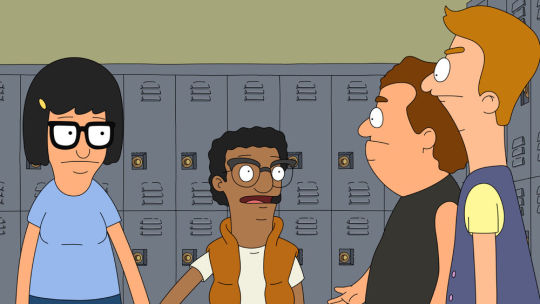
Presenting you the muppet president of "Tina's every other boy" anti-fan club (you know, the ginger kid)
#except zeke. never zeke. and if anyone tells you otherwise in jimmy jr bashing fanfics it's a damn lie#no i don't think he actually has beef with darryl in the episode but he's a jealous mess about the whole fling for sureee#ssshhhhh i'm right#bobs burgers#bob's burgers
22 notes
·
View notes
Text
somehow dodging the dewey madness this time around bc it hit me at the same time as we are having a conversation about brodumba and to be honest no other "i'm lost without him" can ever compare. they've ruined me for every other i'm lost without him dynamic for the rest of all time
#FUCK!!!!!!!!!!!!!!!!!!!!!!!!!!!!!!!!!!!!!!!!!!!!!!!#also. always a funny emotion to have.#watching the bullet whizz past your head when you know if it had come at any other time you would have lost your damn mind over it#anyway i have yet to determine whether this is a net positive (less madness on the whole) or a big mess of a#negative (brodumba guaranteed emotional evisceration) sdkjfsh
10 notes
·
View notes
Text
actually im deleting that one recent response, its late and im tired and while i stand by what i said i feel like i misunderstood the ask too much in my response, which is my bad! and since i misunderstood what was being said it basically nulled the whole point of it
but anyway. my art is not revolutionary, ive never intended for it to come off that way, so im sorry if people got the impression im trying to brag or something. sometimes when i come up with specific features for a character i get excited about it and want to share (just like when i drew keito), but i tend to not really think about how things come across, much less that it could be seen as boastful bc, as was pointed out, im not really doing much in terms of diversity, so it being me boasting didnt even cross my mind. to me im just drawing people and am explaining the thought process behind characteristics, but maybe its better to not point it out? as maybe thatd be more casual and people would care less? i dont know. im autistic so im not the best at this, and i have a tendency to be "too much" in how i act and talk (incase that wasnt already clear). its a bit difficult to navigate but i am doing my best
i will continue doing what i do though, as i feel its less my art and more what i say thats an issue. again though when it comes to speech i dont really know what the right thing to do or say is, so i just speak my mind, but that can easily be misunderstood, so ill try and hold back when it comes to that. if you think i overstep in what i say genuinely feel free to point it out, because again, i struggle with this alot. but please do be patient with me
#i hate miscommunications!!!!!!!#hence why im making this post#ik this should be ignored and whatnot but if my words are being misunderstood it makes me feel genuinely apologetic#even if it was just something minor#its why i tend to overexplain things all the damn time#and then i continued to misunderstand what anon was saying!!!!!!! its a whole mess!!!!!!!!!!!#so i at least wanted to clear that front. i genuinely did not think it would be read into in such a way#discourse tag
12 notes
·
View notes